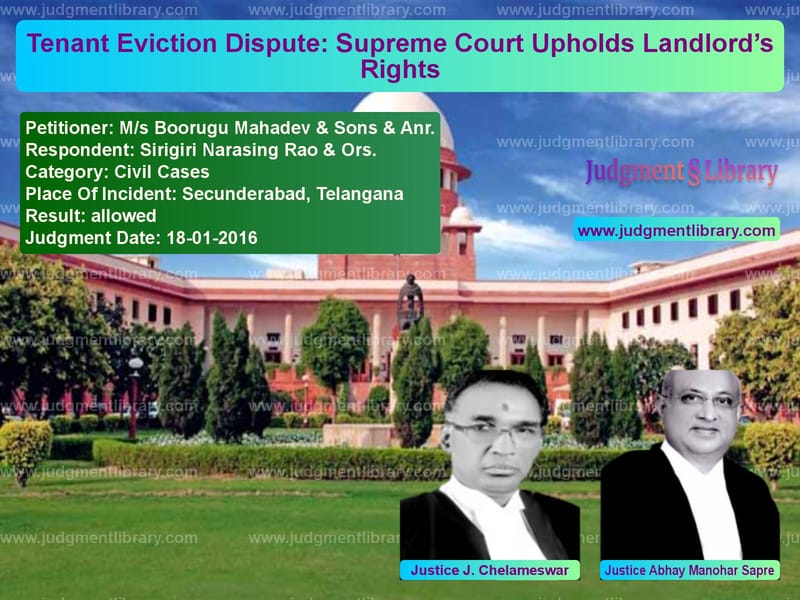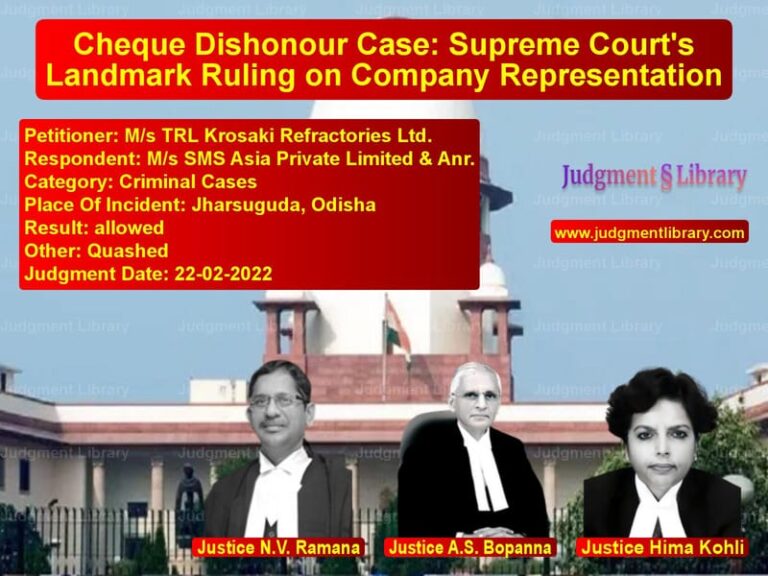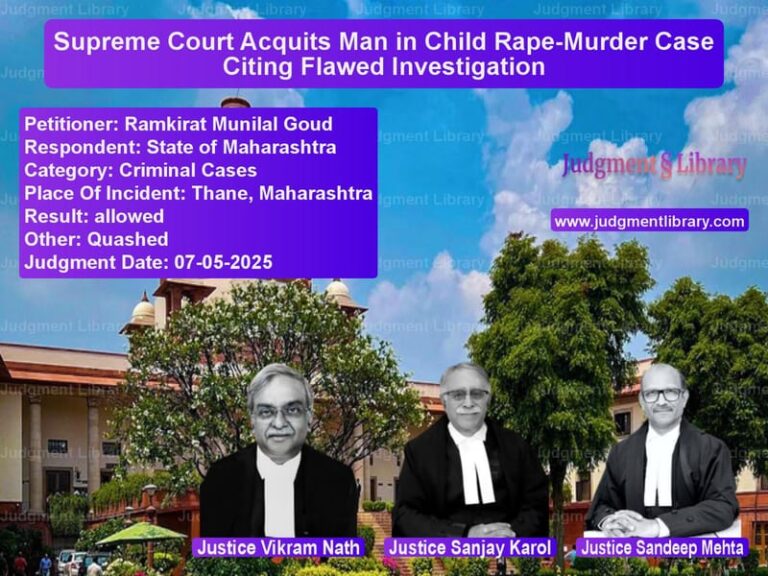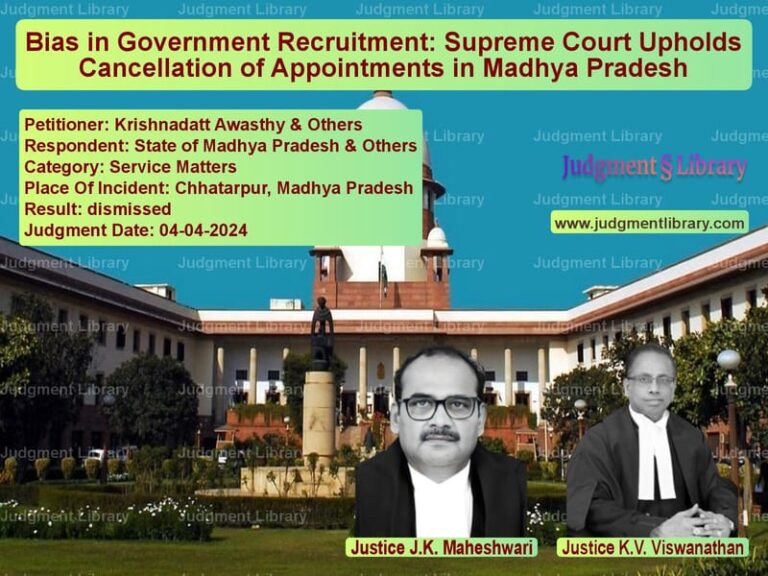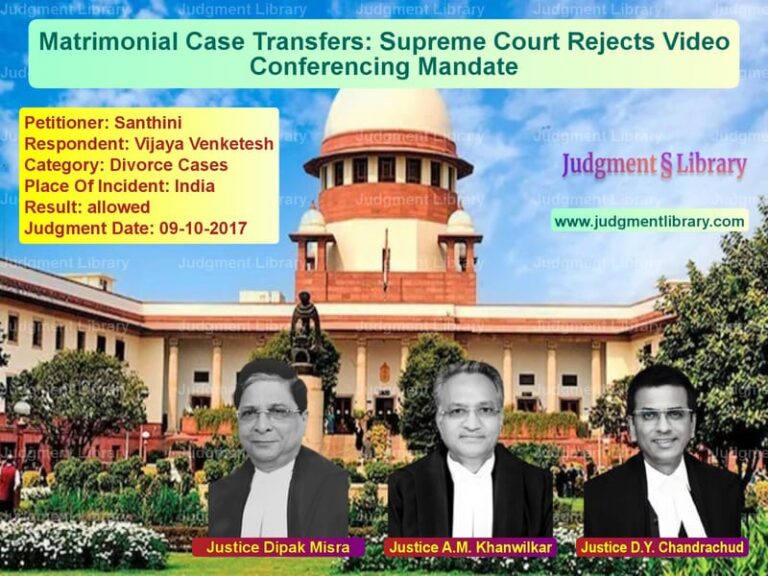Tenant Eviction Dispute: Supreme Court Upholds Landlord’s Rights
The case of M/s Boorugu Mahadev & Sons & Anr. v. Sirigiri Narasing Rao & Ors. is a significant ruling addressing landlord-tenant disputes under the Andhra Pradesh Buildings (Lease, Rent, and Eviction) Control Act, 1960. The Supreme Court overturned the High Court’s decision and restored the eviction order, reinforcing the landlord’s rights when tenants default on rent and dispute ownership.
Background of the Case
The case revolves around a property in Regimental Bazar, Secunderabad, originally purchased by the appellants’ predecessors under a registered sale deed dated July 28, 1904. The predecessors of the respondents continued to occupy the premises as tenants under an agreement dated August 1, 1904, paying a nominal rent that later increased to Rs. 75 per month.
However, the respondents stopped paying rent from June 1, 1987. Despite repeated requests and legal notices, the respondents failed to comply, leading the appellants to file an eviction petition under Section 10 of the Andhra Pradesh Buildings (Lease, Rent, and Eviction) Control Act, 1960.
Key Legal Issues
- Whether the respondents were tenants of the appellants or had ownership rights over the premises.
- Whether the respondents committed willful default in payment of rent, justifying eviction under the Act.
- Whether the High Court exceeded its jurisdiction by interfering with the first appellate court’s findings.
Arguments Presented
Appellants’ Arguments
- The appellants contended that the respondents were tenants who stopped paying rent from June 1, 1987, despite repeated demands.
- The sale deed from 1904 established their ownership, and the respondents’ claim that it was a mortgage transaction was baseless.
- The appellate court had rightly held that the respondents had committed willful default, warranting eviction.
Respondents’ Arguments
- The respondents argued that their predecessors had a mortgage agreement rather than a sale transaction and that they remained the rightful owners of the property.
- They contended that no rent had been paid for over fifty years, proving that they were not tenants.
- The High Court had correctly intervened, finding errors in the appellate court’s ruling.
Supreme Court’s Ruling
The Supreme Court ruled in favor of the appellants, setting aside the High Court’s decision and restoring the eviction order. The Court made the following key observations:
Ownership and Tenancy Relationship Established
- The Supreme Court held that the appellants’ predecessors were the rightful owners based on the sale deed, and the respondents had failed to provide evidence proving a mortgage transaction.
- “The evidence adduced by the appellants to prove their title over the suit premises was sufficient to maintain an eviction petition against the respondents.”
Willful Default in Payment of Rent
- The Court found that the respondents had stopped paying rent from June 1, 1987, which constituted willful default under the Act.
- “Having recorded categorical findings that the relationship of landlord-tenant was proved and the respondents committed a willful default in payment of monthly rent, these findings were binding on the High Court.”
High Court’s Jurisdictional Error
- The Supreme Court ruled that the High Court had improperly re-evaluated factual findings, which was beyond its revisional jurisdiction.
- “The High Court, in its revisional jurisdiction, was not entitled to interfere with the findings of fact recorded by the first appellate court.”
Legal Precedents Considered
The Court relied on several important rulings to determine the scope of revisional jurisdiction:
- Hindustan Petroleum Corporation Ltd. v. Dilbahar Singh (2014) 9 SCC 78 – Held that High Courts cannot interfere with factual findings in revisional jurisdiction.
- Sheela v. Firm Prahlad Rai Prem Prakash (2002) 3 SCC 375 – Clarified the concept of ownership in landlord-tenant disputes.
Key Takeaways from the Judgment
- Landlord’s Right to Eviction: Tenants who default on rent and challenge ownership without proof can face eviction.
- Limited Scope of High Court’s Revisional Powers: High Courts cannot re-evaluate factual findings of lower courts.
- Proof of Ownership Matters: Documentary evidence like sale deeds outweigh oral claims of ownership.
Impact of the Judgment
This ruling has significant implications for landlord-tenant disputes in India:
- For Landlords: Reinforces the importance of proper documentation and legal recourse for recovering property.
- For Tenants: Establishes that ownership claims must be backed by strong evidence.
- For Courts: Reiterates that High Courts should not act as appellate courts in revision petitions.
Conclusion
The case of M/s Boorugu Mahadev & Sons & Anr. v. Sirigiri Narasing Rao & Ors. is a landmark judgment affirming the landlord’s right to evict defaulting tenants. The Supreme Court’s ruling ensures that property rights are protected while preventing misuse of revisional jurisdiction. By restoring the eviction order, the Court upholds the principles of landlord-tenant law and judicial discipline.
Don’t miss out on the full details! Download the complete judgment in PDF format below and gain valuable insights instantly!
Download Judgment: Ms Boorugu Mahadev vs Sirigiri Narasing Ra Supreme Court of India Judgment Dated 18-01-2016.pdf
Direct Downlaod Judgment: Direct downlaod this Judgment
See all petitions in Landlord-Tenant Disputes
See all petitions in Property Disputes
See all petitions in Damages and Compensation
See all petitions in Judgment by J. Chelameswar
See all petitions in Judgment by Abhay Manohar Sapre
See all petitions in allowed
See all petitions in supreme court of India judgments January 2016
See all petitions in 2016 judgments
See all posts in Civil Cases Category
See all allowed petitions in Civil Cases Category
See all Dismissed petitions in Civil Cases Category
See all partially allowed petitions in Civil Cases Category

